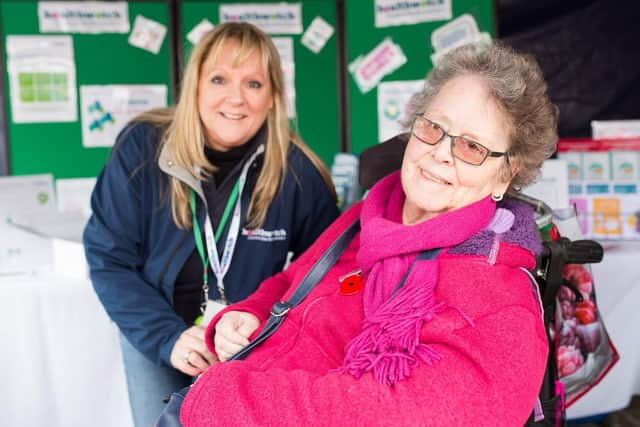Elderly and disabled people are struggling with home care, says watchdog


There are also complaints about the number of carers people see with one person becoming distressed after 17 different people visited his home in a fortnight.
Families have reported a number of problems to Healthwatch Sheffield, which has published a wide-ranging report into home care.
Advertisement
Hide AdAdvertisement
Hide Ad

The number of daily visits varies from one visit by one care worker to four visits by two care workers.
But one relative told Healthwatch: “One of the most distressing things for him was the fact that different carers would come every day.
“We once counted 17 different people across 14 days. None of them got to know his care plan very well, and he was distressed at strangers coming in every day.”
Relatives felt that having multiple carers meant they didn’t get to know the person or their care plan.
Advertisement
Hide AdAdvertisement
Hide Ad

Families said they disliked having lots of people they didn’t know in their home and users found it distressing. They pointed to staff leaving and changing care companies as factors disrupting continuity of care.
Most people had two or three visits daily to help with tasks such as taking medication, getting washed and dressed, toileting, preparing meals and getting in and out of bed.
But late, missed and inappropriate timing of care visits were key concerns.
Healthwatch said: “Users said the times of visits were often inappropriate and didn’t match their needs and preferences, for example with meals.
Advertisement
Hide AdAdvertisement
Hide Ad“Families were particularly concerned about the health implications of people being taken to bed too early and helped out of bed too late the next day.”
Carol is diabetic and injects insulin at meal times. The care company said her diabetes was “not their concern”.
Healthwatch said: “Carol said her meals should be regular to help control her blood glucose levels.
“Carol’s carers would often come at 10am for breakfast, 11.30am for lunch and 4pm for her evening meal. She said this was very unhelpful for managing her diabetes.
Advertisement
Hide AdAdvertisement
Hide Ad“Eventually her GP contacted the company to say that the visits were not at an appropriate time. Carol said the care company’s response was that her diabetes was not their concern.
“They only had to make sure she had her meals and her medication, and because she could inject her insulin there was no need to change the visit times.”
June used home care following a hospital stay but stopped it because she didn’t feel the care workers were supporting her very much.
She said the care workers would make snacks rather than meals and would often say the things she asked them to do weren’t in their remit, such as changing bed sheets.
Advertisement
Hide AdAdvertisement
Hide AdThey often didn’t come to get June out of bed until 11am, so she started sleeping in a chair instead of her bed because it was easier.
Several weeks passed before she managed to cancel the care. She wasn’t charged during that period, but she didn’t want the care or find it useful.
Another person said carers did not space out visits to their relative. “They arrived today at 11am for one visit and 4pm for a second visit. They say that’s the only visits they’re making today, which means she either has to go to bed at 4pm or somehow manage herself.”
Healthwatch said: “There was a perception among families that care workers don’t have enough time during visits, which can lead to a rushed experience of care and tasks being missed or not done properly.
Advertisement
Hide AdAdvertisement
Hide Ad“This may mean that family have to do the missed tasks. People thought longer care visits were needed, however it was also acknowledged that workers’ travel time isn’t always used efficiently.”
One relative said: “One time a new carer came, and she was really fast, she washed mum in 10 minutes. She was really proud of herself, but I don’t feel it was a good experience for my mum.”
Another issue was care plans not being followed or reviewed regularly. Several families said care workers were unfamiliar with plans and they weren’t reviewed regularly enough – they want care workers to read and follow plans.
One person said: “Carers don’t read the care plan. Only one carer has ever asked for the care plan and they were on their second week so were still doing things by the book.”
Advertisement
Hide AdAdvertisement
Hide AdHealthwatch said: “It’s not clear why care plans were not being read, but this could be due to care workers not having enough dedicated time in their work schedule to allow for this.”
Marie has used home care for some time and is frustrated by the lack of plans. “When they reviewed my care plan, they wanted to have a meeting with just me, the social worker and advocate from Disability Sheffield but I wanted other professionals included.
“I had to fight to get them involved. The social worker then wanted to go away and write the care plan for me, but I wanted to be involved. I have now not had a review for two and a half years. You’re meant to have a yearly review.”
http://democracy.sheffield.gov.uk/documents/s34436/Healthwatch-Home-Care-Report.pdf
Ways to improve
Advertisement
Hide AdAdvertisement
Hide AdHealthwatch says home care companies should report how many people who live alone, or lack capacity, have been affected by late and missed visits.
Users and their family should be asked about the quality of care, including late and missed visits, before providers can be contracted to take on a significant number of new clients.
There should be a limit on the number of care workers to be involved in one person’s care and for this to be monitored.
All care workers should be introduced to people before their first care visit together.
Advertisement
Hide AdAdvertisement
Hide AdCompanies should inform people of their monitoring, observation, supervision and training practices through their welcome packs and websites.
Details of the qualifications and experience of individual care workers should be made available to the people they care for and their family carers.
Good work being done
Healthwatch says building a good relationship between a person and their home care workers plays an important role in influencing how satisfied people are with their care.
Linda said her mum was thriving since moving into an extra care scheme flat. She said she was happy knowing her mum was in safe hands.
Advertisement
Hide AdAdvertisement
Hide Ad“There is a café right below her flat where the staff know her and her condition, and this extra stimulation is really helping. She has two visits a day from carers but can increase this as soon as she feels the need to. The carers have got to know her really well and they know how to help.”
Emily explained how home care enables her to stay in her own home and keep enjoying the things that give her pleasure in life. “Alzheimer’s is a cruel thing. It is taking any sense I had. It has changed my outlook on life.
“I accepted that I was going to finish up in a home somewhere, I just hope it is a warm and caring place. With home care I’m able to stay at home and can see the gardens and stay near my neighbour who I like.”
Some families described good experiences with care workers getting to know the person and them getting on well together.
Advertisement
Hide AdAdvertisement
Hide AdHealthwatch said: “Good communication and feeling listened to was characteristic of family carers’ positive experiences.
“These findings suggest that building a good relationship between a person and their home care workers plays an important role in influencing how satisfied people are with their care. The right conditions are needed to enable these relationships to form.”